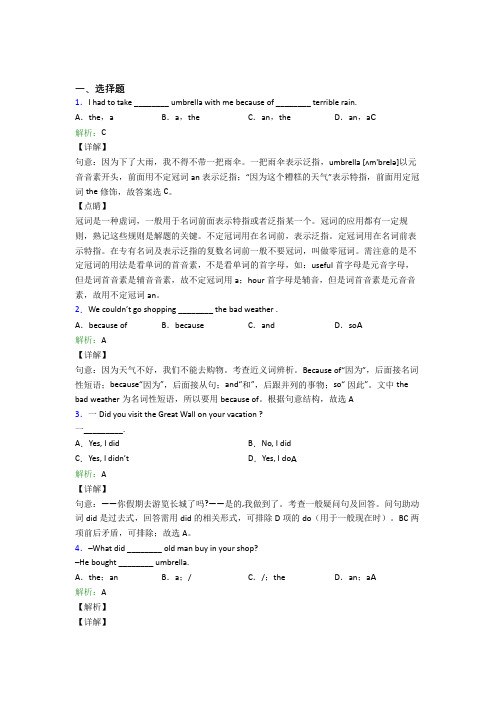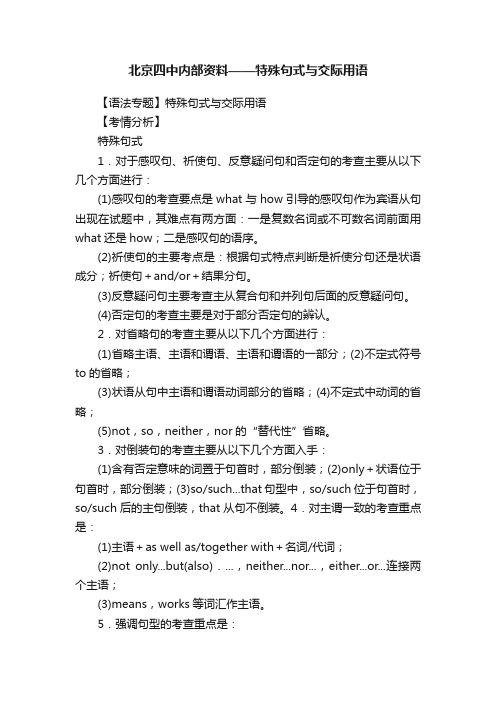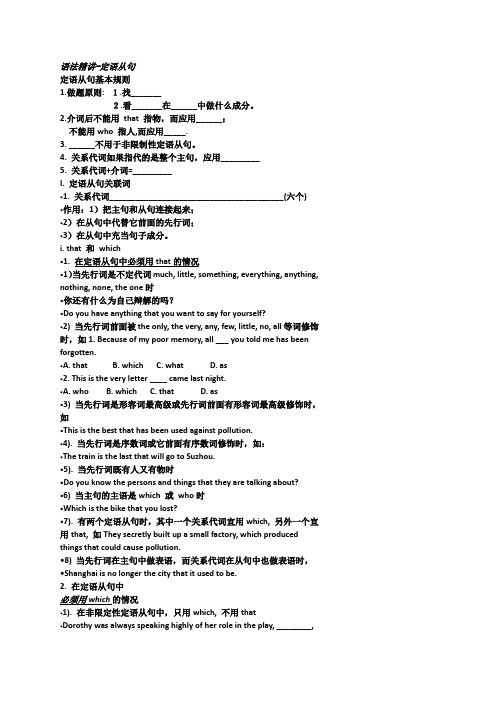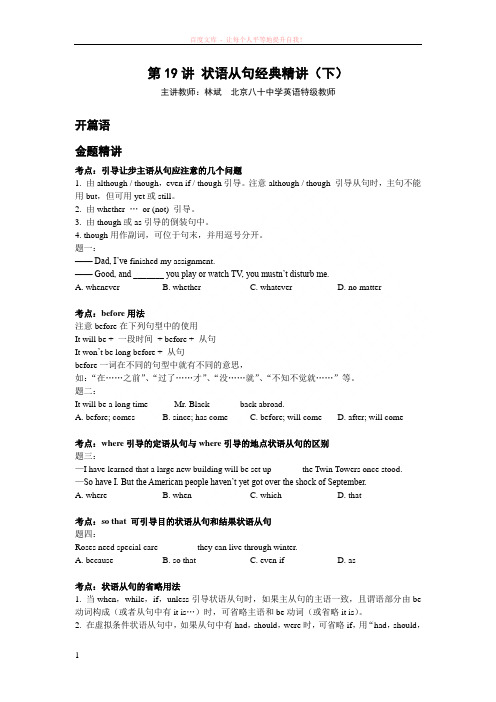北京四中语法辅导 1
北京四中高三英语学法指导与语法难点二 人教版 教案

北京四中高三英语学法指导与语法难点二一关于英语总复习的几点建议(一)学会自主学习所谓自主学习,就是学生具有学好英语的欲望,在老师的指导下能自己确定目标,自己安排进程,自己设计活动,自己寻找材料,自己监督自己,自己总结经验。
课上课下听老师的话是对的,但要有主动性,作学习的主人。
坚持实践第一,以使用英语为主。
简明扼要地对学过的知识进行归纳总结是必要的,但决不能用很多的时间去钻研语法规则。
应该把大部分时间用在阅读、写作和听力的练习上,即应用语言上,尤其要加大和突出阅读的训练。
使用英语的能力是在使用英语的实践中产生和提高的,并不是靠老师给讲会的。
English is best learnt when always used in meaningful communication.学习英语要坚持模仿为主,理论分析为辅,不要过分钻研为什么。
有的同学在学习英语时,采取"君子动口不动手"的态度,一味在那里琢磨理论,而不是抓紧时间动手写写,找出文章赶紧看看或打开录音机听听。
这样的同学最终使用英语的能力不会有大的提高。
(二)抓好基础题无论什么考试,基础的东西都是最重要的。
英语高考也不例外。
考生应努力做到保证拿到基础题的分,力争难题的分。
在复习中,一定要结合实际情况安排练习的难度。
如果水平不是很高,就一定要以练习基础题为主,不要嫌容易,不要跟别人攀比。
要把基础词汇、基本句型弄扎实,要做到懂、会、熟。
越临近高考越要降低难度。
有人以为做多难的练习就能达到多高的水平,其实并不是这样,这也取决于原来的基础。
(三)把《考试大纲》上的词汇表掌握好。
词汇表是高考命题的基础,是应该重点掌握的词汇。
词汇表上的许多名词可归类为阅读词汇,这类词知道意思,会拼写即可。
但动词、介词、连词及其他常用名词等则必须做到四会。
学习词汇表不要照搬词典,词典的解释太繁杂了,高考用不上。
(四)重视总结做题规律和扩大知识面。
背诵短文,例句,甚至例题好处甚多。
北京四中初中英语八年级上册 Unit 1知识点总结(含答案解析)

一、选择题1.I had to take ________ umbrella with me because of ________ terrible rain.A.the,a B.a,the C.an,the D.an,a C解析:C【详解】句意:因为下了大雨,我不得不带一把雨伞。
一把雨伞表示泛指,umbrella [ʌm'brelə]以元音音素开头,前面用不定冠词an表示泛指;“因为这个糟糕的天气”表示特指,前面用定冠词the修饰,故答案选C。
【点睛】冠词是一种虚词,一般用于名词前面表示特指或者泛指某一个。
冠词的应用都有一定规则,熟记这些规则是解题的关键。
不定冠词用在名词前,表示泛指。
定冠词用在名词前表示特指。
在专有名词及表示泛指的复数名词前一般不要冠词,叫做零冠词。
需注意的是不定冠词的用法是看单词的首音素,不是看单词的首字母,如:useful首字母是元音字母,但是词首音素是辅音音素,故不定冠词用a;hour首字母是辅音,但是词首音素是元音音素,故用不定冠词an。
2.We couldn’t go shopping ________ the bad we ather .A.because of B.because C.and D.so A解析:A【详解】句意:因为天气不好,我们不能去购物。
考查近义词辨析。
Because of“因为”,后面接名词性短语;because“因为”,后面接从句;and“和”,后跟并列的事物;so“ 因此”。
文中the bad weather为名词性短语,所以要用because of。
根据句意结构,故选A3.一Did you visit the Great Wall on your vacation ?一_________.A.Yes, I did B.No, I didC.Yes, I didn’t D.Yes, I do A解析:A【详解】句意:——你假期去游览长城了吗?——是的,我做到了。
北京市第四中学高中英语语法学案高中英语时态牢固掌握(二)

高中语法第二讲高中英语时态牢固掌握(二)北京四中张恩I. 一般过去时1. 叙述过去的______动作。
2. 叙述过去__________做的事情。
练一练:✧I ______ (see) him yesterday in the park.✧He told me that he ______ (plan) to go abroad.✧He ______ (take) me to the movies twice a week when I was young.✧When she heard the strange sound, she ______ (get) up to check.提示:如果不规则动词的过去式(如:see-saw)、过去分词没有记住,一定要背哟!II. 过去进行时和过去完成时1. 过去进行时指的是在________________________的动作。
2. 如果强调一个动作发生在另一个_____的动作______就要用过去完成时,即过去的过去。
练一练:✧I __________ (take) a shower when you called me.✧—He took a picture of you just now.—Oh, really. I ____________ (not look).✧She didn’t go to bed until she ____________ (finish) thehomework.✧I ____________ (not have) anything valuable before I came here.III. 一般将来时1. 表示________发生的动作。
2. ____________表示在说话之前主语自己已经决定的计划,表示临时的决定或打算要用___________。
3. ____________表示说话者根据现在的现象“预测”不久即将发生的事情。
北京市第四中学英语 知识讲解-高考总复习:情态动词

高考总复习:情态动词真题再现:1. We have bought so much food now that Suzie won’t be with us for dinner.A. may notB. nee dn’tC. can’tD. mustn’t2. —____you interrupt now? Can’t you see I’m on the phone?—Sorry Sir, but it’s urgent.A. CanB. ShouldC. MustD. Would3. One of our rules is that every student wear school uniform while at school.A. mightB. couldC. shallD. will4. I got close enough to hear them speaking Chinese, and I said “Ni Hao” just as I ____ do in China.A. mustB. mightC. canD. should5. I______ thank you too much for all your help to my son while we were away from home.A. won’tB. can’tC. canD. will6. I’m going to Europe on vacation together with John if I _______ find the money.A. canB. mightC. wouldD. need7. It’s quite warm here; we __________turn the heatin g on yet.A. couldn’tB. mustn’tC. needn’tD. wouldn’t8. I use a clock to wake me up because at six o’clock each morning the train comes by my house.A. couldn’tB. mustn’tC. shouldn’tD. needn’t9. — Happy birthday!—Thank you! It’s the best present _______ I for.A. should have wishedB. must have wishedC. may have wishedD. could have wished10. Oh, I’m not feeling well in the stomach. I ______ so much fried chicken just now.A. shouldn’t eatB. mustn’t have eatenC. shouldn’t have eatenD. mustn’t eat11. Days later, my brother called to say he was all right, but ___________ say where he was.A. mustn'tB. shouldn'tC. wouldn'tD. mightn't答案与解析:1. B。
北京四中内部资料——特殊句式与交际用语

北京四中内部资料——特殊句式与交际用语【语法专题】特殊句式与交际用语【考情分析】特殊句式1.对于感叹句、祈使句、反意疑问句和否定句的考查主要从以下几个方面进行:(1)感叹句的考查要点是what与how引导的感叹句作为宾语从句出现在试题中,其难点有两方面:一是复数名词或不可数名词前面用what还是how;二是感叹句的语序。
(2)祈使句的主要考点是:根据句式特点判断是祈使分句还是状语成分;祈使句+and/or+结果分句。
(3)反意疑问句主要考查主从复合句和并列句后面的反意疑问句。
(4)否定句的考查主要是对于部分否定句的辨认。
2.对省略句的考查主要从以下几个方面进行:(1)省略主语、主语和谓语、主语和谓语的一部分;(2)不定式符号to的省略;(3)状语从句中主语和谓语动词部分的省略;(4)不定式中动词的省略;(5)not,so,neither,nor的“替代性”省略。
3.对倒装句的考查主要从以下几个方面入手:(1)含有否定意味的词置于句首时,部分倒装;(2)only+状语位于句首时,部分倒装;(3)so/such...that句型中,so/such位于句首时,so/such后的主句倒装,that从句不倒装。
4.对主谓一致的考查重点是:(1)主语+as well as/together with+名词/代词;(2)not only...but(also)....,neither...nor...,either...or...连接两个主语;(3)means,works等词汇作主语。
5.强调句型的考查重点是:(1)考查强调句式的基本结构(2)考查含有“not…until…”句型的强调句式(3)考查强调句式的疑问句(4)考查强调句式的正确判断交际用语情景交际是高考必考内容,主要包括习惯应答类和语言结构类两种交际用语。
前者要求考生掌握一些常见的诸如打电话、问路、购物等交际话题的固定套语,以及表示感谢、道歉、请求等的应答用语。
北京市第四中学高中英语语法学案 定语从句基本规则

语法精讲-定语从句定语从句基本规则1.做题原则:1.找_______2.看_______在______中做什么成分。
2.介词后不能用that 指物,而应用______;不能用who 指人,而应用_____.3. ______不用于非限制性定语从句。
4. 关系代词如果指代的是整个主句,应用_________5. 关系代词+介词=_________I. 定语从句关联词•1. 关系代词________________________________________(六个) •作用:1)把主句和从句连接起来;•2)在从句中代替它前面的先行词;•3)在从句中充当句子成分。
i. that 和which•1. 在定语从句中必须用that的情况•1)当先行词是不定代词much, little, something, everything, anything, nothing, none, the one时•你还有什么为自己辩解的吗?•Do you have anything that you want to say for yourself?•2) 当先行词前面被the only, the very, any, few, little, no, all等词修饰时,如1. Because of my poor memory, all ___ you told me has been forgotten.•A. that B. which C. what D. as•2. This is the very letter ____ came last night.•A. who B. which C. that D. as•3) 当先行词是形容词最高级或先行词前面有形容词最高级修饰时,如•This is the best that has been used against pollution.•4). 当先行词是序数词或它前面有序数词修饰时,如:•The train is the last that will go to Suzhou.•5). 当先行词既有人又有物时•Do you know the persons and things that they are talking about? •6) 当主句的主语是which 或who时•Which is the bike that you lost?•7). 有两个定语从句时,其中一个关系代词宜用which, 另外一个宜用that, 如They secretly built up a small factory, which produced things that could cause pollution.•8) 当先行词在主句中做表语,而关系代词在从句中也做表语时,•Shanghai is no longer the city that it used to be.2. 在定语从句中必须用which的情况•1). 在非限定性定语从句中,只用which, 不用that•Dorothy was always speaking highly of her role in the play, ________,of course , made the others unhappy.•A. who B. which C. this D. what•2). 当动词短语中的介词提前时,只用which, 不用that•The invention ______ she spent 2 years will do good to the world. •A. which B. that C. on which D. when边讲边练•1. Is there anything ____ you don’t understand about the problem?•2. He was late for the opening ceremony, ____ was very surprising to me.3. 关系代词who/whom/whose•1). 在定语从句中作主语用_____, ____ 省略•2). 在定语从句中作宾语用_____, ____ 省略•3). 在定语从句中作定语用_____, ____ 省略•表示某人的whose = of whom 表示某物的whose = of which •This is the house whose window broke last night.•= This is the house, the window of which broke last night.•= This is the house, of which the window broke last night.边讲边练用关系代词who, whom, that或whose填空•1. Lu Xun, ____ real name was Zhou Shuren, wrote many political novels and essays.•2. The man ____ you met just now is my old friend.•3. The man ____ is walking on the playground is my old friend. •4. “介词+关系代词”引导的定语从句•1). 介词放在关系代词前,关系代词只能用which或whom,关系代词不能省略。
第19讲北京四中状语从句经典精讲(下)讲义 (1)

第19讲状语从句经典精讲(下)主讲教师:林斌北京八十中学英语特级教师开篇语金题精讲考点:引导让步主语从句应注意的几个问题1. 由although / though,even if / though引导。
注意although / though 引导从句时,主句不能用but,但可用yet或still。
2. 由whether …or (not) 引导。
3. 由though或as引导的倒装句中。
4. though用作副词,可位于句末,并用逗号分开。
题一:——Dad, I’ve finished my assignment.——Good, and _______ you play or watch TV, you mustn’t disturb me.A. wheneverB. whetherC. whateverD. no matter考点:before用法注意before在下列句型中的使用It will be + 一段时间+ before + 从句It won’t be long before + 从句before一词在不同的句型中就有不同的意思,如:“在……之前”、“过了……才”、“没……就”、“不知不觉就……”等。
题二:It will be a long time _____ Mr. Black ______ back abroad.A. before; comesB. since; has comeC. before; will comeD. after; will come考点:where引导的定语从句与where引导的地点状语从句的区别题三:—I have learned that a large new building will be set up ______ the Twin Towers once stood. —So have I. But the American people haven’t yet got over the shock of September.A. whereB. whenC. whichD. that考点:so that 可引导目的状语从句和结果状语从句题四:Roses need special care ________ they can live through winter.A. becauseB. so thatC. even ifD. as考点:状语从句的省略用法1. 当when,while,if,unless引导状语从句时,如果主从句的主语一致,且谓语部分由be 动词构成(或者从句中有it is…)时,可省略主语和be动词(或省略it is)。
北京四中语法辅导 1

北京四中高考英语应试常见错误分析(三)谓语动词的语气虚拟语气是动词的一种特殊形式,用来表示说话人所说的话不是客观存在的事实,而是一种与事实相反的愿望、可能、推测、建议、要求、假设或主观的设想等。
它较多地用于条件句。
除掌握其基本形式外,我们应着重了解使用虚拟语气的常见句型。
1、 had hoped 后面的宾语从句常用“would+动词原形”来表示虚拟语气。
2、 would rather与had rather后面的宾语从句常用动词的过去式来表示虚拟语气。
3、在句型“It is (high/about ) that….” 后面的从句常用动词的过去式来表示虚拟语气。
4、 wish 后面的宾语从句中,表示现在或将来的愿望时,用动词的过去式或would/could/might+动词原形来表示虚拟语气; 表示过去的愿望时,用had+过去分词或would/could+have+过去分词来表示虚拟语气。
5、在“It is +形容词/过去分词+主语从句”这一句型中,主语从句中用(should)+ 动词原形来表示虚拟语气。
常见的这部分形容词/过去分词有:important, necessary, probable, possible, strange,better; ordered, suggested, requested, demanded, required, etc.6、部分动词后面的宾语从句中,用(should)+ 动词原形来表示虚拟语气。
常见的这部分动词有:advise, suggest, insist, order, request, require, beg, demand, intend, desire, decide, etc.7、部分名词后面的同位语从句中,用(should)+ 动词原形来表示虚拟语气。
常见的这部分名词有:suggestion, advice, desire,decision, demand, order, requirement, etc.8、 as if 和 as though后面的从句中,用动词的过去式来表示对现在的虚拟;用would+动词原形来表示对将来的虚拟;用had+过去分词来表示对过去的虚拟。
- 1、下载文档前请自行甄别文档内容的完整性,平台不提供额外的编辑、内容补充、找答案等附加服务。
- 2、"仅部分预览"的文档,不可在线预览部分如存在完整性等问题,可反馈申请退款(可完整预览的文档不适用该条件!)。
- 3、如文档侵犯您的权益,请联系客服反馈,我们会尽快为您处理(人工客服工作时间:9:00-18:30)。
北京四中高考英语应试常见错误分析(三)谓语动词的语气虚拟语气是动词的一种特殊形式,用来表示说话人所说的话不是客观存在的事实,而是一种与事实相反的愿望、可能、推测、建议、要求、假设或主观的设想等。
它较多地用于条件句。
除掌握其基本形式外,我们应着重了解使用虚拟语气的常见句型。
1、 had hoped 后面的宾语从句常用“would+动词原形”来表示虚拟语气。
2、 would rather与had rather后面的宾语从句常用动词的过去式来表示虚拟语气。
3、在句型“It is (high/about ) that….” 后面的从句常用动词的过去式来表示虚拟语气。
4、 wish 后面的宾语从句中,表示现在或将来的愿望时,用动词的过去式或would/could/might+动词原形来表示虚拟语气; 表示过去的愿望时,用had+过去分词或would/could+have+过去分词来表示虚拟语气。
5、在“It is +形容词/过去分词+主语从句”这一句型中,主语从句中用(should)+ 动词原形来表示虚拟语气。
常见的这部分形容词/过去分词有:important, necessary, probable, possible, strange,better; ordered, suggested, requested, demanded, required, etc.6、部分动词后面的宾语从句中,用(should)+ 动词原形来表示虚拟语气。
常见的这部分动词有:advise, suggest, insist, order, request, require, beg, demand, intend, desire, decide, etc.7、部分名词后面的同位语从句中,用(should)+ 动词原形来表示虚拟语气。
常见的这部分名词有:suggestion, advice, desire,decision, demand, order, requirement, etc.8、 as if 和 as though后面的从句中,用动词的过去式来表示对现在的虚拟;用would+动词原形来表示对将来的虚拟;用had+过去分词来表示对过去的虚拟。
例题1. It is necessary that the manager will sign all of the copies, notA B C just the top one .D解析:A错。
在necessary后面的主语从句中,应用虚拟语气,即:用(should)+ 动词原形来表示。
所以改为:(should) sign。
2.On the hero’s pale face there was a half-smile that seemed toA Bsuggest that he be ready to give his life for the country.C D解析:C错。
只有当suggest作“建议”讲时,其后的宾语从句才要用虚拟语气。
而此处suggest并不作“建议”讲,而是“表明”的意思,因此其后的宾语从句不能用虚拟语气。
故改为:was。
3.The headmaster required that all the students are polite to others .A B C D解析:C错。
require后的宾语从句要用虚拟语气, 即:用(should)+ 动词原形来表示。
故改为:(should) be。
2. It was suggested that Jim studies the material more thoroughlyA B Cbefore attempting to pass the exam.D解析:B错。
be suggested后的主语从句要用虚拟语气, 即:用(should)+ 动词原形来表示。
故改为:(should) study。
3. She wishes that her parents didn’t send her the candy yesterdayA B Cbecause she’s on a diet.D解析:B错。
根据观察可发现:宾语从句是对过去的虚拟,应该用had+过去分词来表示。
故改为:hadn’t sent。
4. The political candidate talked as if he has already been elected toA B C Dthe presidency.解析:C错。
as if 后面的从句中, 用had+过去分词来表示对过去的虚拟。
故改为:had。
四、情态动词除了掌握其基本用法外,还应注意以下问题:1、must表示“必须、不得不”时,其否定式是needn’t或 do not have to;而must not则表示“不许、禁止”。
2、need与dare既可作情态动词,也可作实义动词,此时,若要构成问句和否定句,就需要助动词do/does/did。
3、“can+have+过去分词”结构用在问句和否定句中,表示对过去的事情所作的推测。
4、“could+have+过去分词”结构用来表示有可能发生在过去的某事,实际上并没有发生。
5、“may/might+have+过去分词”结构用来表示对过去的事情所作的推测。
6、“must+have+过去分词”结构用来表示对过去的事情所作的肯定判断。
7、“should/ought to+have+过去分词”结构用来表示过去应做而未做的事,含有自责或责备的语气。
8、“need not+have+过去分词”结构用来表示过去做了没有必要做的事。
例题1. You shouldn’t have run across the road without looking around , youA Bmay be knocked down by a car.C D解析:C错。
通过理解可知,对方并没有被车撞倒,这只是说话人对过去的一种推测。
所以应改为:might have been。
2.He was a good swimmer so he could swim to the river bank whenA B Cthe boat sank .D解析:C错。
can 只表示一种能力,而be able to 不光表示具有某种能力,而且最终克服困难做成了某事。
所以应改为:was able to。
五、非谓语动词:动词不定式对动词不定式,以下这些方面我们必须把握好:1、不定式作主语时,常使用it作形式主语。
2、当不定式的逻辑主语是动作的承受者时,一般要用不定式的被动式。
但是在某些形容词后面,即使是这样,也不用被动式。
3、某些动词后面只能跟不定式作宾语。
一定要牢记!ask, afford, agree, decide, demand, dare, expect, fail, happen, hope, hesitate, manage, offer, ought, plan, intend, prepare, pretend, wish, refuse, promise, etc.4、当不定式作宾语,且后面又有宾语补足语时,通常用it作形式宾语来代替不定式,而把不定式后置。
5、had better, would rather, rather than等词的后面只跟不带to的不定式。
6、介词but, except, than后面可以跟不定式作宾语。
7、下列动词可跟不定式作宾语补足语。
have, let, make, advise, cause, ask, allow, permit, drive, encourage, expect, force, get, intend, invite, order, persuade, remind, teach, tell, want, warn, forbid, etc.但要注意,使役动词和感官动词:let, have, make, see, feel, hear, watch, notice, observe等后面须跟不带to的不定式。
8、不定式的逻辑主语通常是句子的主语,如果不定式有自己的逻辑主语,它通常由for或of引起。
9、动词不定式的一般式表示它与谓语动词同时或之后发生;其完成式则表示发生在谓语动词之前的动作。
但要注意动词:plan, expect, intend, wish, mean, want, suppose, would (should)like等后面的不定式完成式则表示原打算要做而最终未做成的事情。
例题:1. Don’t forget bringing your English-Chinese dictionary with you whenA Byou come here next week .C D解析:A错。
Forget表示“未做某事”时,后面只能跟不定式作宾语。
因此应改为:to bring。
2. I haven’t decided if to go to the cinema or to stay at home .A B C D解析:A错。
不定式前面不能用连词if, 只能用whether。
3. There will be more than three hundred scientists attending the meetingA B Cheld the day after tomorrow.D解析:D错。
这里不应用过去分词作定语,因为会议还未举行,应改为不定式to hold作定语。
4. It took her nearly half a year to find his address, only learning that heA Bhad passed away ten years before .C D解析:B错。
动词的ing形式不能作结果状语,只有不定式可作结果状语,故而改为:to learn。
5. The babysitter was made feed two children and do some cleaning .A B C D解析:A错。
虽然make后面跟不带to的不定式作宾语补足语,但是,当其变为被动语态时,则要加上to,故而改为:to feed。
6. Contrary to common practice, he let his daughter studying at homeA Binstead of sending her to a school nearby.C D解析:B错。
let后面只有跟不带to的不定式作宾语补足语,不能跟动词的ing 形式作宾语补足语,故而改为:study。
